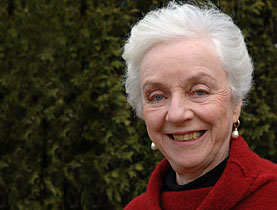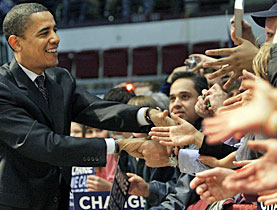Swiss could have acted sooner on Jewish assets

Zurich-born Madeleine Kunin served as United States ambassador to Switzerland during the Clinton administration and the Holocaust assets crisis of the 1990s.
Kunin is a supporter of Hillary Clinton for the Democratic presidential nomination. In an interview with swissinfo she bemoans the fact that there are fewer women involved in politics in the US than in Switzerland.
The only woman to serve three terms as a governor in United States history is publishing her memoires, entitled “Pearl, Politics and Power”.
swissinfo: You were born into a Jewish family in 1933. In what circumstances did you emigrate to the United States?
Madeleine Kunin: I was only six and a half when I left Switzerland in 1940. My father had died in 1936 and my mother was raising us alone, my brother and me. I was very young and not aware of what was going on in Europe at the time. My mother, who was born in Zurich, took the decision to leave.
The main reason to go to America was to escape the threat of the Holocaust because there was a lot of fear, especially in Jewish families, that Hitler would invade Switzerland.
swissinfo: In 1996, you came back to Switzerland as US ambassador. Did you feel a sense of revenge?
M.K.: More a sense of pride and real joy that I could come back as an American ambassador, something my mother had never dreamed of, although she often said that “anything is possible in America”.
swissinfo: Straight away you had to deal with the affair surrounding Holocaust-era Jewish assets in Swiss banks. In your book you write that nobody in the State Department had expected this to become so huge. Why did it?
M.K.: First, new information about the role of Switzerland in the Second World War was coming out, as historical documents that had been top secret were becoming public. Things were happening in the US, too.
The World Jewish Congress was very active and the Clinton administration supported the idea that the bank accounts be returned to their owners. Also, there was the sense that time was running out for survivors and that one had to act quickly.
swissinfo: Would this affair have been managed more quickly had the Swiss government not refused to take part in the negotiations between the banks and the US?
M.K.: This affair would have been resolved more quickly if both the government and the banks had acted right after the Second World War! They really never did acknowledge the issue for years. But when it came up in 1996, they could have managed better if they has responded more quickly.
swissinfo: Did Bill Clinton and his administration’s involvement make things worse?
M.K.: I don’t remember Bill Clinton making public statements about the issue and I don’t believe that he made things worse. For my part, my job was really to maintain good relations with the Swiss while prodding them to take action.
However, there was in the US a lot of exaggeration of the Swiss role during the war. Senator [Alfonse] D’Amato [who campaigned on behalf of Holocaust survivors] at times exploited the situation. While I didn’t approve of all the tactics that were used, like the threat of a boycott of Swiss banks and goods, I thought it was time to resolve the issue and important to move forward.
swissinfo: Has the page been definitely turned?
M.K.: I don’t see any impact of that affair on bilateral relations today. By and large, the issue has been addressed. Some of the account holders have not been found and some banks have not paid out, but what is important is that so many Swiss people do recognize that it was an issue that needed to be addressed.
swissinfo: In the US presidential campaign, you are supporting Hillary Clinton. Is it time now for her to quit?
M.K.: I’ll be supporting Hillary Clinton until she decides that she should drop out. That time has not come yet. She still has a chance because some superdelegates to the Democratic convention have not made a decision. It’s a small chance, it’s not hopeful but it’s not over. Hillary is an extraordinary resilient fighter.
swissinfo: And Barack Obama?
M.K.: He is very impressive and inspirational. He is also bringing a lot of young people into the process. The ideal for the Democratic Party would be to have him and Hillary on the same ticket.
Whatever happens, there will be a united Democratic Party against John McCain in November. I have no doubt about victory. This campaign has always been full of surprises but the level of dissatisfaction is so high among Americans that they really want change.
swissinfo: What should be the priorities of George Bush’s successor?
M.K.: First, to get us out of Iraq. Second, to invigorate the economy. And to restore the reputation of the US, that is to establish once again the US as a great democracy that believes in working with other countries in a positive way.
swissinfo: US women got the right to vote in 1920; Swiss women only in 1971. But the US has never had a female president and Switzerland has had two. And the US ranks behind Iraq and Afghanistan in terms of female representation in parliament. Why?
M.K.: Many women in America are turned away by how ugly and expensive the process is. In Switzerland, the process is more civilized. Switzerland deserves praise for the place that women have in politics.
On the other hand, one has to recognize that the Swiss presidency is a weak presidency and that is not the case in the US. I don’t believe that ending the two-party system would help. What would improve the situation for women in American politics is quotas because countries that have quotas have improved women’ representation.
swissinfo-interview: Marie-Christine Bonzom in Washington
Born into a Jewish family in Zurich on September 28, 1933.
Emigrated to the United States aged about six with her mother and brother.
A graduate of the University of Vermont, the University of Massachusetts and the Columbia University School of Journalism.
Divorced in 1995 with four children from that marriage, remarried in 2006.
Lives in Burlington, the largest city in the state of Vermont.
The author of several books, Kunin teaches at the University of Vermont.
Before entering politics, Madeleine Kunin was a journalist with the daily newspaper Burlington Free Press, in Vermont.
The first American woman to be elected governor of a state for three terms, she governed Vermont from 1984 to 1991.
In 1992, Kunin campaigned for Bill Clinton, was a member of the three-person committee that selected Al Gore as Bill Clinton’s vice-president and participated in the transition team that helped form President Clinton’s first cabinet.
She was Deputy Secretary of Education from 1993 to 1996, before serving as ambassador to Switzerland from 1996 to 1999.
She is the co-chair of Hillary Clinton’s campaign in Vermont and a candidate for one of the state’s delegate seats at the Democratic convention.

In compliance with the JTI standards
More: SWI swissinfo.ch certified by the Journalism Trust Initiative










You can find an overview of ongoing debates with our journalists here . Please join us!
If you want to start a conversation about a topic raised in this article or want to report factual errors, email us at english@swissinfo.ch.